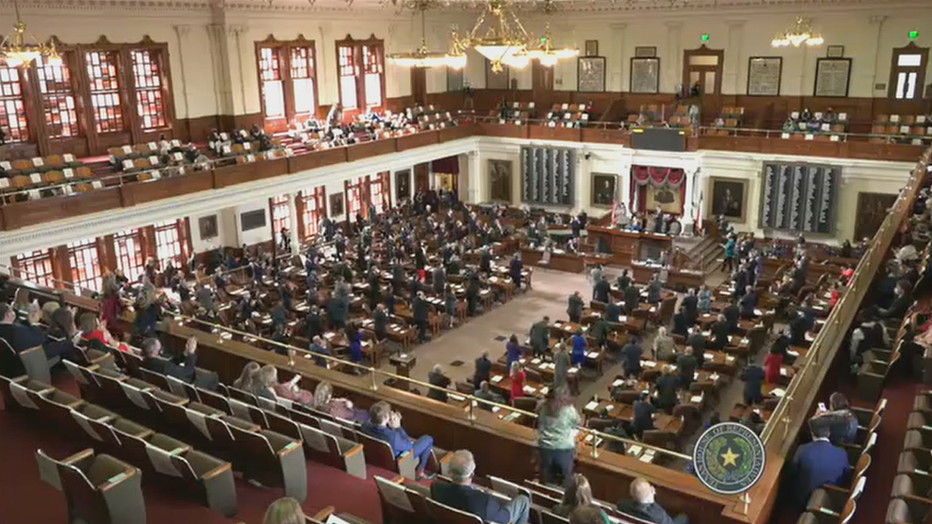Texas Legislature opens with COVID-19 protocols, extra security in place
Texas Legislature opens with COVID-19 protocols, extra security
The usual pomp and circumstance of the opening day ceremonial session was toned down due to the pandemic.
AUSTIN, Texas - There was a heavy presence of Texas troopers outside the state Capitol in Austin as lawmakers returned to work for the first day of the new legislative session amid FBI warnings of armed protests around the country.
After last week’s violence at the U.S. Capitol, the Texas Department of Public Safety sent more state troopers to secure the state capitol. Some of the more than 100 troopers outside the Capitol on Tuesday wore tactical vests and riot gear, but there were no incidents.
The usual pomp and circumstance of the opening day ceremonial session was toned down due to the pandemic.
The public gallery inside both chambers were loosely filled to allow for social distancing. Lawmakers and their guests wore face coverings unless they were speaking. COVID-19 protocols required everyone entering the House and Senate chambers to first be tested.
State Rep Dade Phelan (R-Beaumont) was elected speaker of the House in a 143-2 vote. Freshman State Rep. Jeff Cason (R-Bedford) was one of the two to vote against Phelan.
Phelan replaces Dennis Bonnen, who did not run for re-election after he was caught on tape plotting to defeat several fellow Republicans in their party primaries.
Phelan has served in the House since 2015 and started working at the state capitol 27 years ago as a staffer. He talked about the priorities and challenges ahead for the session.
"To get Texans back to work we must protect our citizens’ health and safety, must revitalize our economy, must reduce burdensome regulations. We can do this while balancing the budget without shifting the burden to our hardworking families," he said.

Gov. Greg Abbott urged lawmakers to work together over the next 140 days.
"May God bless you in your efforts and may God bless the great state of Texas," Abbott said.
Two House members from North Texas said did not attend opening day.
Michelle Beckley of Carrollton and Ana-Marie Ramos of Richardson believed the ceremony was a COVID-19 super spreader event and both Democrats were sworn in elsewhere.
In the Senate, Hood County Sen. Brian Birdwell was elected President Pro-Tem. He received a warm welcome by his friend, Lt. Governor Dan Patrick.
"Brian with all of my heart, you are the finest human being I known in my life," Patrick said.
Sen. Birdwell was working in the pentagon on September 11 when a plane crashed into the federal building. He was burned on over 60 percent of his body. He reflected on that day and his new role.
"I'm already emotional and I don't mean to be," Birdwell said. "My commitment is to my duty, to the senators who have chosen me today and to the citizens of Texas that I will serve."
Writing the two-year state budget is the first big job for lawmakers, which will be more difficult because of the pandemic and economic downturn it created.
State Comptroller Glenn Hegar predicted a $1 billion shortfall. That’s an improvement over the $4 billion he predicted last year.
The state does have a savings account it calls the Rainy Day Fund but Republicans have been reluctant to tap into it.
The fund has about $10 billion in it – a fraction of the $112 billion two-year budget.
Other issues that are likely to come up this session include redistricting or redrawing congressional, state house and senate districts following the 2020 census.
Democrats will also push for statewide police reform. They’ve already proposed a ban on chokeholds.
Some Republicans want to restrict the governor’s emergency powers after they say Gov. Greg Abbott overstepped his authority during the pandemic.
One popular idea that helped struggling restaurants may become permanent this session – alcohol-to-go.
Gov. Abbott issued a waiver last year to allow customers to take home alcoholic beverages, including mixed drinks, to permit their delivery.
"The restaurant industry has been very adversely affected by the pandemic and it’s just been a revenue source. It’s enabled some to keep their doors open," said St. Rep. Charlie Green, a Republican from Fort Worth.
Mixed drinks must be sold with food and can be delivered through delivery services.

